Redditor Asks If She Is Wrong For Making Her Teen Son Walk The Dog While Other Kids Are Spared
Family pets are an important part of life for many people, and they require a lot of care. It is the responsibility of the entire family to care for and provide for the family pet, but unfortunately, this responsibility doesn't always get shared equally.
Some family members may do the majority of the work, such as feeding, cleaning, and playing with the pet, while others may be responsible for only minor tasks or none at all. This unequal sharing of responsibility can cause tension within the family, as well as put a strain on the pet.
It can also lead to resentment from those who have to do most of the work, as they may feel that their contributions are not appreciated or respected.
One Redditor posted her problem: her teen son complains about being the only one walking the dog. His mom has good reasons for it.
"My 16-year-old is really good with our dog, and she listens to him and respects him. My 12-year-old runs around and plays with her, so I see it more as exercise for her, but she doesn't always use the bathroom, and when she does, he doesn't always tell me if something is off.
My daughter works and has extracurricular activities and isn't home as much. Hence, I default to asking my oldest son over her even when she's home because I usually am doing a million things at any given time."
Read this interesting story below:
OP asks:

OP often asks. Her 16-year-old son mostly walks the dog, and OP believes that they have valid reasons

It is because he is the best with the dog

The Importance of Responsibility in Family
Assigning responsibilities within a family structure is crucial for teaching accountability. Dr. John Bowlby, a developmental psychologist, highlights that children learn important life skills through structured responsibilities.
Research in the Journal of Family Psychology indicates that children who are given responsibilities at home develop higher self-esteem and better interpersonal skills.
Understanding Parental Expectations
Parental expectations play a significant role in shaping adolescent behavior, as highlighted by Dr. Diana Baumrind, a developmental psychologist known for her research on parenting styles. Her work emphasizes that authoritative parenting—characterized by high expectations and support—can lead to positive outcomes for children.
However, when expectations are not aligned with a child's abilities or interests, it can create tension and resistance, as seen in the case of the adolescent feeling unfairly treated compared to peers.
Other kids aren't doing a good job

OP is sick and often too busy

She posted some clarification

Balancing responsibilities can sometimes lead to feelings of unfairness among siblings. A family therapist notes that when responsibilities are unevenly distributed, it can create resentment and conflict.
Studies show that families who discuss and negotiate responsibilities report healthier dynamics and less conflict.
Research in the Journal of Adolescence indicates that adolescents who feel their needs are not being met often exhibit behavioral issues, including defiance and disengagement. Understanding these dynamics can help parents navigate their expectations more effectively and foster a supportive environment.
Recognizing that every child is unique and may require different approaches is essential for fostering cooperation and respect.
OP added some info:
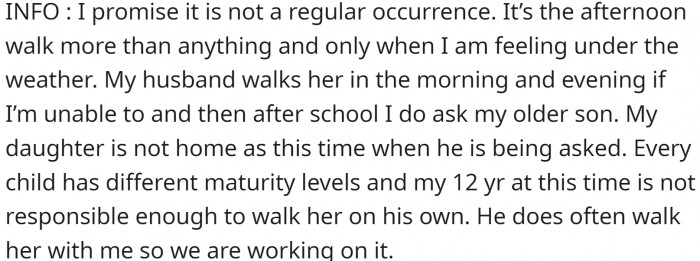
OP has offered the following explanation for why they think they might be the asshole:

How are the rest of the household chores divided?
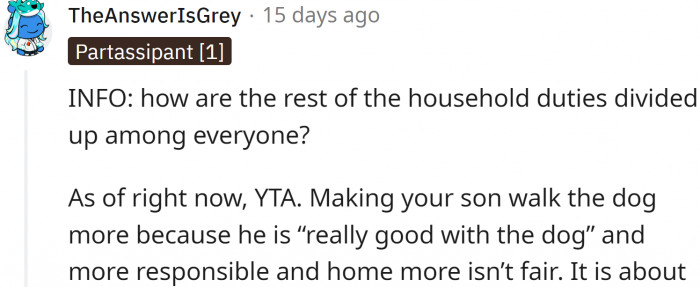
Promoting Fairness in Household Duties
Establishing clear expectations around household duties can prevent misunderstandings. Dr. Susan Johnson, a relationship expert, emphasizes that discussing roles and responsibilities openly can enhance family harmony.
Research suggests that families who engage in regular communication about responsibilities experience lower levels of conflict.
For instance, creating a chore chart can help clarify expectations and promote fairness.
The Importance of Fairness in Parenting
Fairness in parenting is crucial for maintaining a positive family dynamic. Dr. John Gottman’s research highlights that children who perceive fairness in how responsibilities and privileges are distributed tend to have better relationships with their parents.
When children feel they are being treated unfairly compared to their peers, it can lead to feelings of resentment and conflict.
OP is basically rewarding the kids who are less responsible

"The other children will only get better at any task with more practice."
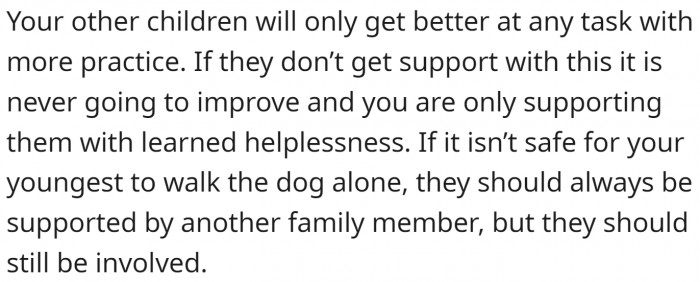
"Walking the dog should not be labeled as a chore"

Encouraging teamwork in household duties can also foster cooperation. A psychologist specializing in family dynamics notes that when family members work together toward common goals, it enhances bonding.
Studies indicate that cooperative activities within families lead to stronger emotional connections and improved relationships.
One effective strategy for promoting fairness is to involve children in discussions about expectations and responsibilities. Allowing them to voice their opinions can foster a sense of autonomy and respect, ultimately leading to greater cooperation.
Additionally, parents can benefit from keeping lines of communication open, encouraging children to express their feelings and concerns about responsibilities.
A schedule in advance might help
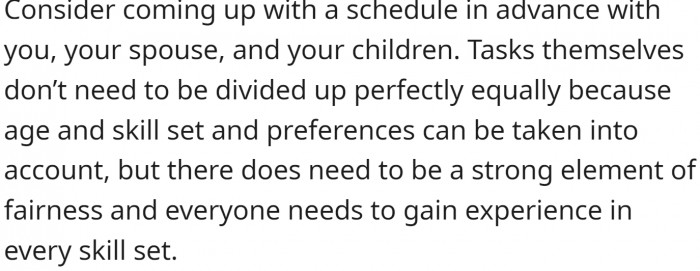
OP says:

The 12-year-old feeds the dog and the guinea pig

The Role of Empathy in Family Dynamics
Empathy plays a pivotal role in family relationships. Dr. Brené Brown emphasizes that understanding each other’s feelings can reduce conflict and promote harmony.
Research shows that practicing empathy within families leads to better communication and stronger relationships.
Engaging in family discussions about feelings can foster emotional connection and understanding.
Managing Expectations and Responsibilities
Managing expectations and responsibilities is a balancing act for parents. A clinical psychologist explains that when parents set unrealistic expectations, it can lead to stress and anxiety for adolescents.
Understanding the developmental stage of the child is essential for setting appropriate expectations that align with their capabilities.
Family dog belongs to the whole family - and so are the duties it brings

That's not the way kids learn...
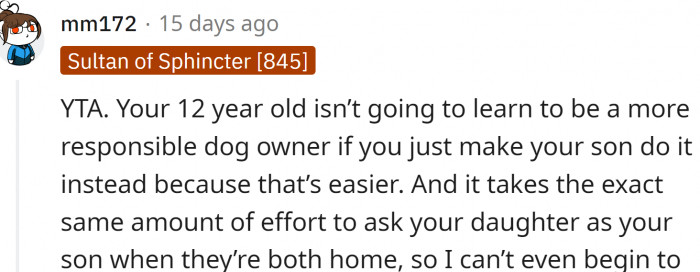
The bottom line:

In conclusion, effectively managing expectations in parenting requires open communication, understanding, and fairness. Research indicates that when parents prioritize these elements, they can foster a more supportive environment for their children.
By engaging in discussions about responsibilities and expectations, parents can strengthen their relationships with their children and promote emotional well-being.
OP responded:
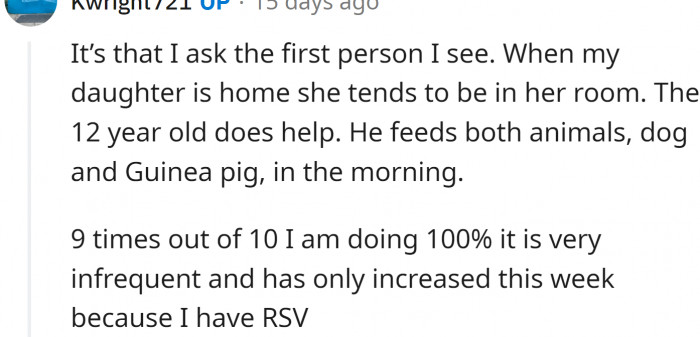
Makes sense:
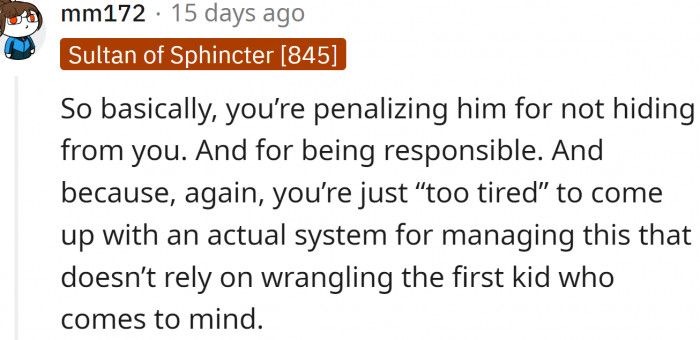
OP posted an edit:

To avoid problems like this, it is important for all members of the family to contribute to caring for the pet. This could be in the form of taking turns feeding, playing with, or walking the pet, as well as helping with cleaning up after the pet.
It is also important to ensure that all family members are on the same page when caring for the pet. This means having clear expectations for each person and discussing any issues that may arise.
This can help ensure that everyone is aligned when it comes to taking care of the pet.
Psychological Analysis
This scenario highlights the complexities of managing expectations in parenting, especially when children perceive unfair treatment. It's essential for parents to engage in open discussions about responsibilities to foster a more cooperative and supportive relationship.
By recognizing and addressing their children's feelings, parents can work toward creating a more balanced and understanding family dynamic.
Analysis generated by AI
Analysis & Alternative Approaches
Psychological research emphasizes the importance of fairness and communication in parenting. According to studies published by the American Psychological Association, fostering an environment of understanding and respect can lead to healthier family dynamics.
Ultimately, by recognizing the unique needs of each child and maintaining open lines of communication, parents can navigate expectations more effectively and promote positive development.
Analysis & Alternative Approaches
Ultimately, understanding the dynamics of responsibility within families is crucial for fostering healthy relationships. Research emphasizes that effective communication, fairness, and empathy are key components in promoting harmony.
By addressing these aspects, families can navigate challenges more effectively and strengthen their bonds.



